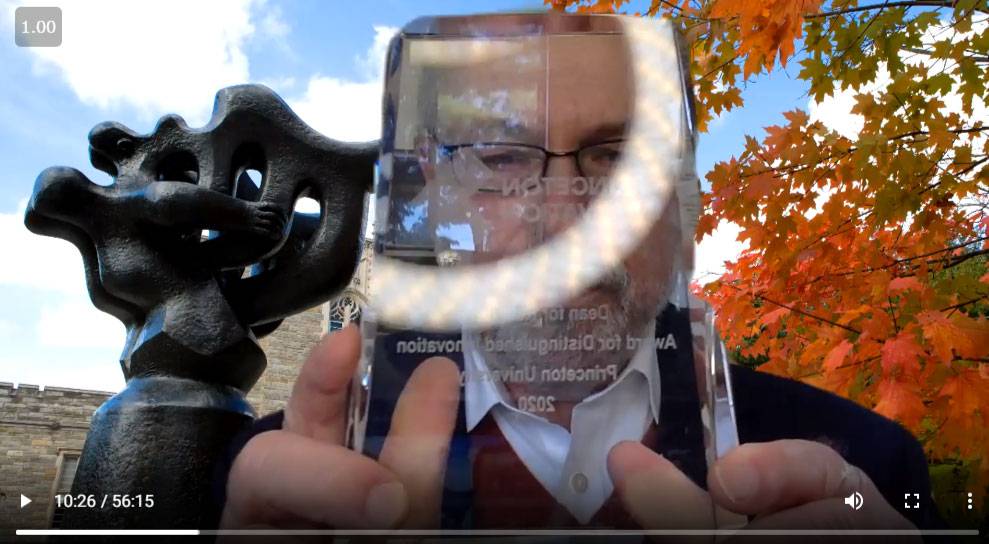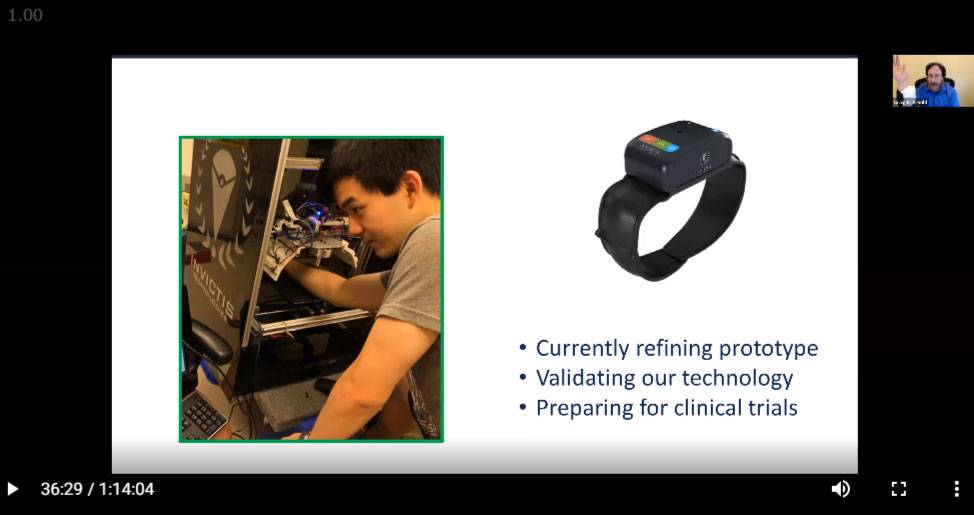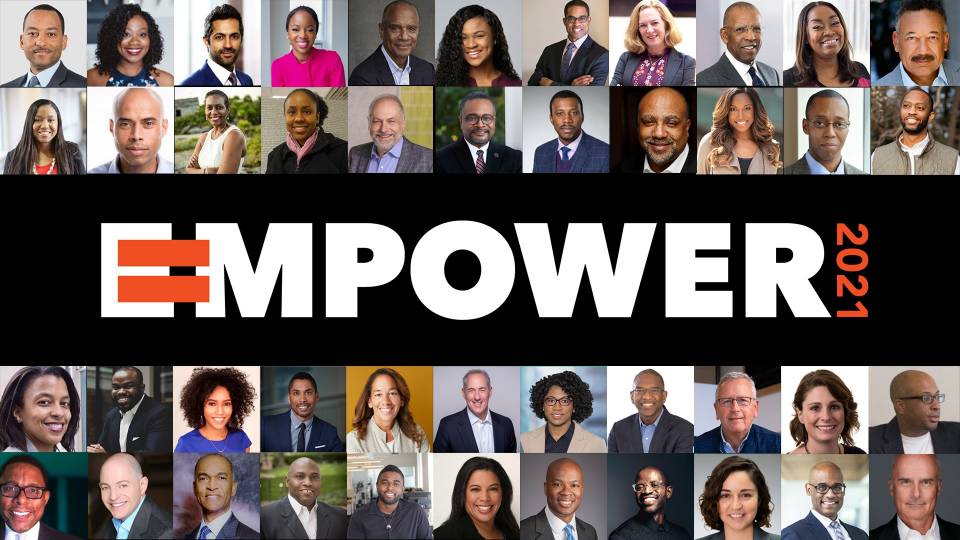Engage 2020, a three-day innovation and entrepreneurship conference held Nov. 4-6, brought together collaborators in academia, government, industry, investment and entrepreneurship to discuss ways to accelerate research and its impact.
Princeton University’s Vice Dean for Innovation Rodney Priestley announced three new programs that aim to build a better future through research and scholarship at Engage 2020, the University’s innovation and entrepreneurship conference held Nov. 4-6.

Microsoft President Brad Smith, a member of the Class of 1981, opened a session about the collaborative relationship of Princeton and Microsoft with review of the global nature of innovation in the 21st century.
"Innovation at Princeton is about bringing a positive impact to society,” said Priestley, who leads the Princeton Innovation initiative. “This is a bottom-up endeavor that is driven by the entire Princeton community.” A professor of chemical and biological engineering, Priestley is also an entrepreneur who has cofounded two companies based on his lab’s research.
The three new programs are:
- Princeton Wharton Executive Education Course (for faculty):
A partnership with the Wharton School of the University of Pennsylvania will bring executive education programming to Princeton faculty to help them take on advisory roles at companies formed around innovations from their laboratories and scholarship. - Princeton Techstars Innovation Bootcamp (for graduate students and postdoctoral researchers):
Techstars, a leading startup accelerator and global innovation network, will offer a two-day intensive program for graduate students and postdoctoral researchers who want to lead the creation of startup companies. - Intelispark Consulting on Federal Funding for Startups (for faculty, graduate students and postdoctoral researchers):
Providing individualized support, Intelispark will advise faculty and researchers on how to seek federal small business research funding through programs such as the Small Business Innovative Research (SBIR) and Small Business Technology Transfer (STTR) grants.
Engage 2020 attracted over 3,300 registrants and featured more than 55 sessions and 170 speakers over three days of programming in technology transfer, industry engagement, innovation and entrepreneurship. The conference was co-chaired by Coleen Burrus, director of Corporate Engagement and Foundation Relations, and Anne-Marie Maman, executive director of the Princeton Entrepreneurship Council.
Presentations and panels included Princeton researchers, inventors and entrepreneurs as well as partners in government, industry and investment in fields such as energy and sustainability, bioengineering, art and architecture, and social impact. All sessions were recorded and can be accessed free of charge by creating an account at the conference website.

Dean for Research Pablo Debenedetti presented a new University award, the Dean for Research Award for Distinguished Innovation, to Robert Prud’homme, professor of chemical and biological engineering, for leading the invention of flash nanoprecipitation to address challenges in drug delivery.
“Entrepreneurship is not just about starting companies,” said Dean of the School of Engineering and Applied Sciences Andrea Goldsmith, who came to Princeton in September 2020 from Stanford University and is a cofounder of two successful wireless technology startups. “It is also about forging new paths and taking risks, not only in commercial companies but in social endeavors, and in any organization.”
Goldsmith, the Arthur LeGrand Doty Professor of Electrical Engineering, continued: “To increase Princeton’s impact, we need to take our ideas out of academia. My view for Princeton is to foster a diverse and inclusive tech hub in the tri-state area.”
At Engage 2020, several mid-Atlantic universities and companies joined Princeton faculty, alumni and students in panels and presentations that focused on how innovation and entrepreneurship can provide solutions to societal challenges. These challenges included sea level rise, clean energy technologies, urban mobility, online education and social injustice. The conference also reflected Princeton’s growing role in the global innovation ecosystem, with speakers joining from around the world, including from Africa in a session highlighting the importance of engaging scientists from underrepresented countries.

Artist, entrepreneur and philanthropist Kwanza Jones, a member of the Class of 1993, delivered the conference keynote address highlighting her team’s approach to investment in early stage ventures. As the cofounder and CEO of the Kwanza Jones & José E. Feliciano SUPERCHARGED Initiative (KJSI), she has created numerous opportunities by committing more than $75 million to founders, fund managers and educational organizations.
Princeton’s Dean for Research Pablo Debenedetti said that the University’s innovation initiative stemmed from the realization that Princeton discoveries have the potential to make a tangible difference in everyday lives, as long as the discoveries are shared.
“A few years ago, Princeton resolved to prioritize bringing the cutting-edge work being done on campus to the wider world, both now and into the future,” said Debenedetti, the Class of 1950 Professor in Engineering and Applied Science and a professor of chemical and biological engineering. “The strength and commitment to living the University’s informal motto, ‘In the Nation’s service and the service of humanity,’ has been taking shape all across campus in numerous and exciting ways.”
One of the ways this commitment is taking shape is through new awards for innovation among faculty and students. Professor of Chemical and Biological Engineering Robert Prud’homme received the Dean for Research Award for Distinguished Innovation — which recognizes a faculty-led solution for a problem of importance to society — for the invention of flash nanoprecipitation, a method that can be used to encapsulate drugs for targeted delivery in the body. Miles Cole, a member of the Class of 2022, was honored with the Tiger Entrepreneur Award.
In another conference session recognizing work that benefits society, Princeton researchers presented ongoing research on COVID-19, from halting the spread of the virus to social and economic problems. The projects stemmed from roughly half a million dollars in research funding that Princeton allocated toward pandemic-related research earlier this year. Conference sessions also focused on the pandemic’s effect on investment opportunities and remote internships.

Princeton faculty members including Clifford Brangwynne, professor of chemical and biological engineering, presented recent findings on preventing coronavirus transmission as part of a panel on Princeton-funded COVID-19 research projects.
Other faculty-led inventions were on display during the conference at Princeton’s annual technology showcase, Celebrate Princeton Innovation, now in its 12th year. Technologies included a new intravenous injection system, a model for predicting hurricane damage under future climate scenarios, and a computer chip for speedy and low-cost artificial intelligence for a variety of uses in vehicles and mobile devices. A new video series features the technologies.
In addition to numerous sessions offering practical entrepreneurship advice, several University-led and alumni-led companies took part in a startup showcase. One of the featured companies was Offchain Labs, Inc., which builds secure and scalable blockchain solutions for online transactions, co-founded by Princeton’s Edward Felten, the Robert E. Kahn Professor of Computer Science and Public Affairs and director of Princeton’s Center for Information Technology Policy. Another company, Tendo Technologies, is developing technology for monitoring flows of liquids and gases in medical and other settings, based on research from the lab of Marcus Hultmark, associate professor of mechanical and aerospace engineering.
The conference also highlighted the value of industry-academia research partnerships to advance research outcomes. Bonnie Bassler, Princeton’s Squibb Professor in Molecular Biology, chair of the Department of Molecular Biology and a Howard Hughes Medical Institute investigator, noted that Princeton is home to collaborations with tremendous potential for meaningful outcomes.
One such research collaboration is with Microsoft, whose president Brad Smith earned his undergraduate degree at Princeton in 1981. Smith introduced the panel on the collaborative relationship of Princeton and Microsoft with remarks on the nature of innovation in the 21st century, the issues it is raising, and the opportunities for Princeton both on campus and in partnership with others.

Craig Arnold, the Susan Dod Brown Professor of Mechanical and Aerospace Engineering, was one of several Princeton Innovators who talked about the potential for University discoveries to benefit society as part of the annual technology showcase Celebrate Princeton Innovation.
Throughout the three days, many speakers and panelists remarked on the importance of inclusivity and diversity in innovation. Capping off the week was a presentation by entrepreneur and music artist Kwanza Jones, who graduated from Princeton in 1993 and, in addition to earning a law degree, become a philanthropist and investor in enterprises that support education, equality and equity.
Jones emphasized investment with the goal of service to others at the forefront of the efforts. “Impact is key,” Jones said. “What is it that you are going to do to help others? Think about ‘Who am I helping, how am I being of service, how am I making an impact beyond just me?’”







